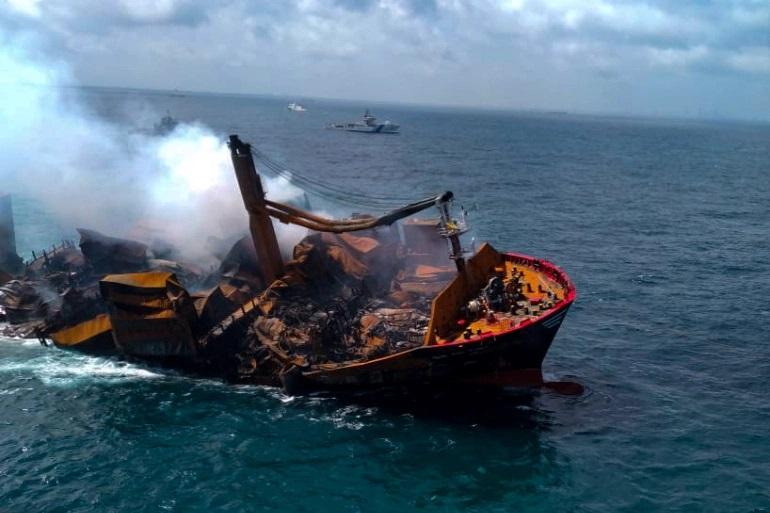Smoke rises from a fire on board the MV X-Press Pearl vessel as it sinks while being towed into deep sea off the Colombo Harbour. Photo:Reuters
By Patryk Krych | The World Daily | JUNE 2nd 2021
In what’s been recorded as one of Sri Lanka’s worst maritime disasters in history, a cargo ship off the country’s West coast that was carrying tonnes of dangerous chemicals had finally sunk after two weeks on fire, according to the Sri Lankan government and navy.
The ship, MV X-Press Pearl, registered as a Singaporean vessel, had been carrying 1,486 containers after it was loaded in India on May 15, on the port of Hazira. The majority of its cargo consisted of varying chemicals and cosmetics, however, this also included about 25 tonnes of Nitric acid, which is known to be highly corrosive.
A fire had been sparked on the ship on May 20, forcing the crew to anchor the vessel off Sri Lanka’s Western coast, about 18 kilometers from Colombo. The battle against the fire had been raging since then. According to the navy, flaming containers full of chemicals had been falling off the ship and spilling into the ocean throughout this time.
Despite the efforts of authorities, the blaze had been viciously burning for 12 days without relent. After it had begun to sink, with water having reportedly submerged the ship’s quarterdeck on Wednesday, a salvage operation began, with the aim of towing the vessel out to deep sea, according to officials. It was during this towing operation when entire rear part of the ship had sunk, marking the vessel’s fate.
“The ship is resting in the bottom of the seabed now. There is no more towing. We have stopped trying to tow it out of the Sri Lankan waters,” said Captain Indika de Silva, the Sri Lankan navy spokesman. “Now our concern is about any oil spill. We are closely monitoring this and so far we have not detected any spill. It will be devastating if that happens, but we are taking all precautions.”
With much of the ship’s cargo having been destroyed by the flames and the dangerous chemicals being allowed to freely pollute the nearby waters and beaches, as well as the resulting plastic pellets flooding fishing grounds and coastlines, the incident is being marked as one of the most prominent environmental crises Sri Lanka’s ever suffered.
“This is an unfortunate incident for Sri Lanka. It has negatively impacted the country in many ways. What we are doing right now is minimising the negative impact,” said Dharshani Lahandapura, chairman to Sri Lanka’s Marine Environment Protection Authority (MEPA).






